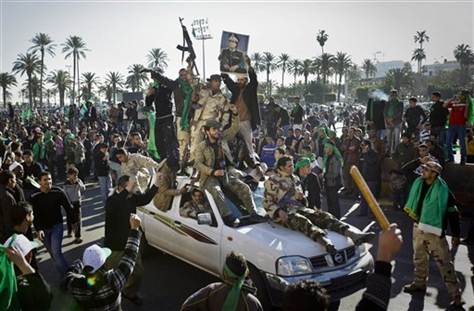
Under NATO’s Flag: an Interim Assessment of the Mission in Libya (Part Three)
Publication: Eurasia Daily Monitor Volume: 8 Issue: 153
By:

As in Iraq and Afghanistan, a Western coalition intervened in Libya with only a weak grasp of the local society. The coalition underestimated the resilience of Colonel Muammar Gaddafi’s base of social support in the country’s west. It seemed blindsided by the complexity of tribal dynamics among its suddenly acquired protégés in the country’s east. In that polarized context, the allies misjudged the level of force necessary for a quick success of their intervention. This proved insufficient for short-term victory over Gaddafi, but only sufficient to shore up the rebels, thus producing a stalemate between the internal forces, and escalation of the civil war. This in turn necessitated escalation of air bombing, with further damage to infrastructure. The coalition did not adequately check the rebels before arming and funding them. Initially it portrayed the rebellion as holding democratic promise for Libya, but has toned down such claims.
Unlike pre-2001 Afghanistan and pre-2003 Iraq, there was an ample Western presence on the ground in Libya prior to the military operation. Undoubtedly, embassies and oil companies had a strong grasp of local society and its dynamics. Whether the coalition drew on that information adequately in planning this intervention seems to be an open question.
Western belligerents did not anticipate the intervention’s adverse impact on their core interests in Libya. These interests focus on: reliable access to oil and gas supplies, effective policing of illegal migration to Europe, and the suppression of transnational jihadism and associated threats.
Prolonged hostilities have totally halted Libyan oil and gas deliveries to Europe, with long-term damage to the infrastructure for production and export in Libya. This issue is missing entirely from the coalition’s debates, and almost entirely from the media coverage. The production halt in Libya contributes to the rise of oil and gas prices in Europe. Among other countries, Italy needs an increase in Russian gas imports, and Germany in Russian-delivered oil, to fill supply gaps in the absence of deliveries from Libya. The prolonged war increases the scale of population displacement while the system of migration control is breaking down. A growing refugee stream is reaching Italy, which seeks unsuccessfully to redistribute the refugees to European Union countries. In Libya’s eastern half, jihadi groups previously suppressed by the Gaddafi regime are reported to have joined the diverse array of rebel forces.
Although the intervention carries NATO’s political approval and flag, only seven (out of 28) NATO countries currently participate in combat actions. The United States takes the position that it plays a “supportive role” (basically, high-end command-control and intelligence). Germany and Turkey, with NATO’s largest forces in Europe, do not participate in combat actions. Britain and France bore the brunt from the outset, and are bearing a growing share as some countries quietly withdraw or reduce their commitment.
This conforms to an evolving pattern of Western wars of choice. They are waged by coalitions-of-the-willing, with limited participation (“national caveats”) by the half-willing, and with opt-outs for the unwilling and the unable. In the final analysis, this is the result of an unconvincing casus belli –whether in Afghanistan, Iraq, or Libya.
War aims and regime change are twin sides of one issue. This is proving especially vexing in Libya. From the first days of the intervention, the allies characterized Gaddafi as a horrific criminal figure, “against his own people” as well as against the international order. US President Barack Obama’s speech at the National Defense University gave an early signal in this regard (White House press release, March 30) and the allies followed suit. On several occasions, NATO spokesmen intimated that his death in an air strike would be a desirable outcome. In the ensuing weeks and months, coalition leaders defined regime change as a central war aim, and had Gaddafi indicted by the International Criminal Court.
Inconclusive military operations, however, caused some reconsideration. Already in mid-July, allies were offering Gaddafi a chance to stay in Libya, implying immunity, if he resigned from power. A negotiated solution with his inner circle, or elements of it, had apparently become a possible option. Many Western commentators also felt that the international indictment had been a mistake, precisely because it barred a negotiated solution. Gaddafi and his government, however, refuse such a deal thus far. Some mediators are at work, including the Russian foreign ministry and presidential envoy Mikhail Margelov (Interfax, August 5).
At this point, a negotiated solution would have to address Gaddafi’s status and that of his family, power-sharing between Tripoli’s pro-Gaddafi authorities and Benghazi rebels, and revenue-sharing between them, among other issues. Such negotiations, if held, would be widely perceived as the consequence of “NATO” being held to a draw by Gaddafi’s forces.
To avoid that worst-case scenario, the coalition can continue the war of attrition for a long time to come, eroding Gaddafi’s forces but also the coalition’s own reputation at the same time. It can also resort to an abrupt escalation of air strikes, but its head-room for this is less than it was some weeks ago. The longer or more intensive the air war, the greater the costs of post-conflict reconstruction. Interfering with supplies of fuel, electricity, and even food to Tripoli, so as to turn its population against the authorities, or the authorities against Gaddafi, is an option mentioned by many observers. But this would essentially amount to waiting for a lucky break, and would in any case discredit the coalition’s humanitarian rationale for the war.
The option of using special troops on the ground seems more plausible. Although the UN Security Council’s resolutions (1970 and 1973) do not authorize this, the coalition has already ignored these resolutions by arming the rebels and selective enforcement of the naval blockade. Since both sides have so intensely personalized this conflict, taking out Gaddafi from the air or by a special-troop raid could open the way to a political settlement consistent with NATO’s credibility.
The coalition’s intervention and the forms it took (prolonging and expanding a civil war, mobilizing local proxy troops, no plans to avoid the halt in oil and gas production) have greatly complicated the post-conflict settlement. Nevertheless, guaranteeing Western interests in Libya to the same level as prior to February 2011 (oil and gas supplies, migration policing, suppression of jihadism and arms trafficking) must be the core objective in shaping a post-conflict settlement. This will also form the basis for assessing the Western military intervention’s results.




